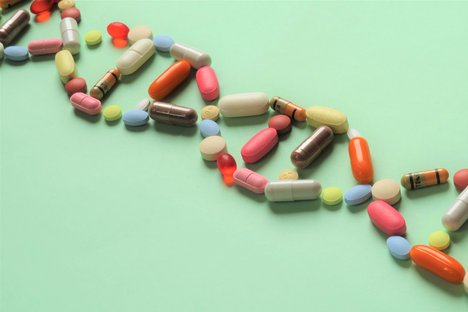博文
让药物适应DNA可使副作用减少30%
||
《柳叶刀》:让药物适应DNA可使副作用减少30%
诸平
据奥地利维也纳医科大学(Medical University of Vienna简称MedUni Vienna)2023年2月3日报道,使药物适应 DNA 可使副作用减少30% (Adapting drugs to DNA results in a 30% reduction in side-effects)。
一个国际研究小组,包括来自MedUni Vienna的科学家并由荷兰莱顿大学医学中心(Leiden University Medical Center)领导,发现当药物剂量适应他们的DNA时,患者的严重副作用减少了30%。这项发表在《柳叶刀》(The Lancet)杂志上的研究,首次展示了根据个人遗传信息开药的实际应用。详见:Prof Jesse J Swen, Cathelijne H van der Wouden, Lisanne EN Manson, Heshu Abdullah-Koolmees, Kathrin Blagec, Tanja Blagus, Stefan Böhringer, Prof Anne Cambon-Thomsen, Erika Cecchin, Ka-Chun Cheung, Vera HM Deneer, Mathilde Dupui, Prof Magnus Ingelman-Sundberg, Siv Jonsson, Candace Joefield-Roka, Katja S Just, Prof Mats O Karlsson, Lidija Konta, Rudolf Koopmann, Marjolein Kriek, Prof Thorsten Lehr, Christina Mitropoulou, Emmanuelle Rial-Sebbag, Victoria Rollinson, Rossana Roncato, Maria Skokou, Prof Matthias Schwab, Prof Daniela Steinberger, Prof Julia C Stingl, Roman Tremmel, Richard M Turner, Mandy H van Rhenen, Cristina L Dávila Fajardo, Prof Vita Dolžan, Prof George P Patrinos, Prof Munir Pirmohamed, Prof Gere Sunder-Plassmann, Prof Giuseppe Toffoli, Prof Henk-Jan Guchelaar. A 12-gene pharmacogenetic panel to prevent adverse drug reactions: an open-label, multicentre, controlled, cluster-randomised crossover implementation study. The Lancet, Published: February 04, 2023, 401(10374): 347-356. DOI: 10.1016/S0140-6736(22)01841-4. https://doi.org/10.1016/S0140-6736(22)01841-4
处方中“一刀切(one-size-fits-all)”方法现在已经过时了。由于我们遗传信息的差异,我们对某种特定药物的反应可能各不相同。例如,有些人比其他人更快地处理药物,因此需要更高的剂量才能达到预期的效果。因此,个性化治疗是更可取的。为促进这一点,MedUni Vienna 人工智能研究所(Institute of Artificial Intelligence at MedUni Vienna)的马提亚斯· 萨姆沃尔德(Matthias Samwald)研究小组开发了“DNA药物护照(DNA drug passport)”。这本护照将各个患者的基因图谱与其作用受DNA影响的药物联系起来。通过扫描护照,医生和药剂师可以为他们正在治疗的个人确定最佳药物剂量。
标准剂量与调整剂量(Standard dose versus adjusted dose)
此研究发现,使用药物护照的患者(其剂量已根据其DNA进行了调整)比使用标准剂量药物的患者减少了30%的严重副作用。在这项研究中,来自7个欧洲国家的约7,000名患者接受了各种医学专业的检查,包括肿瘤学、心脏病学、精神病学和普通医学。
所有参与者都被开了一种药物,其处理过程受遗传影响。首先对所有患者的DNA进行了定位。研究人员随后检查了12种特定基因。结果发现,50种基因变异影响了39种药物的疗效。在开始治疗后长达12周的时间里,经过专门培训的护士会联系患者,询问他们的副作用,例如腹泻、贫血、神经痛或味觉丧失。
DNA 药物护照持有人不仅副作用较少,而且对护照本身也表示高度满意。据研究人员称,护照让患者感觉更有控制力,因为他们积极参与个性化治疗。
莱顿大学医学中心临床药学教授Henk-Jan Guchelaar表示:“我们首次证明,‘量身定制的’策略可在临床环境中大规模发挥作用。我们现在有足够的证据开始实施它。”
本研究由欧盟委员会地平线2020计划(European Commission's Horizon 2020 programme, No. 668353)资助的国际项目“无处不在的药物基因组学”("Ubiquitous Pharmacogenomics"简称U-PGx) 的目标,是通过药物遗传学测试对欧洲患者进行有效的治疗优化。
U-PGx联盟(U-PGx consortium)由荷兰莱顿大学医学中心(Leiden University Medical Center)牵头,包括以下其他机构:奥地利维也纳医科大学、瑞典乌普萨拉大学(Uppsala Universitet)、英国利物浦大学(University of Liverpool)、瑞典卡罗林斯卡学院(Karolinska Institutet)、Biologis、KNMP、UMC Utrecht、金螺旋基金会(Golden Helix Foundation)、德国斯图加特的临床药理学研究学院(Institut für Klinische Pharmakologie in Stuttgart)、意大利阿维亚诺肿瘤治疗中心(Centro di Riferimento Oncologico Aviano)、希腊帕特雷大学(University of Patras)、西班牙安达卢西亚政府(Junta de Andalucía)、法国图卢兹大学(Université de Toulouse)、德国亚琛大学门诊中心(Universitätsklinikum Aachen)以及斯洛文尼亚卢布尔雅尼大学(Univerza v Ljubljani)。
上述介绍,仅供参考。欲了解更多信息,敬请注意浏览原文或者相关报道。
Background
The benefit of pharmacogenetic testing before starting drug therapy has been well documented for several single gene–drug combinations. However, the clinical utility of a pre-emptive genotyping strategy using a pharmacogenetic panel has not been rigorously assessed.
Methods
We conducted an open-label, multicentre, controlled, cluster-randomised, crossover implementation study of a 12-gene pharmacogenetic panel in 18 hospitals, nine community health centres, and 28 community pharmacies in seven European countries (Austria, Greece, Italy, the Netherlands, Slovenia, Spain, and the UK). Patients aged 18 years or older receiving a first prescription for a drug clinically recommended in the guidelines of the Dutch Pharmacogenetics Working Group (ie, the index drug) as part of routine care were eligible for inclusion. Exclusion criteria included previous genetic testing for a gene relevant to the index drug, a planned duration of treatment of less than 7 consecutive days, and severe renal or liver insufficiency. All patients gave written informed consent before taking part in the study. Participants were genotyped for 50 germline variants in 12 genes, and those with an actionable variant (ie, a drug–gene interaction test result for which the Dutch Pharmacogenetics Working Group [DPWG] recommended a change to standard-of-care drug treatment) were treated according to DPWG recommendations. Patients in the control group received standard treatment. To prepare clinicians for pre-emptive pharmacogenetic testing, local teams were educated during a site-initiation visit and online educational material was made available. The primary outcome was the occurrence of clinically relevant adverse drug reactions within the 12-week follow-up period. Analyses were irrespective of patient adherence to the DPWG guidelines. The primary analysis was done using a gatekeeping analysis, in which outcomes in people with an actionable drug–gene interaction in the study group versus the control group were compared, and only if the difference was statistically significant was an analysis done that included all of the patients in the study. Outcomes were compared between the study and control groups, both for patients with an actionable drug–gene interaction test result (ie, a result for which the DPWG recommended a change to standard-of-care drug treatment) and for all patients who received at least one dose of index drug. The safety analysis included all participants who received at least one dose of a study drug. This study is registered with ClinicalTrials.gov, NCT03093818 and is closed to new participants.
Findings
Between March 7, 2017, and June 30, 2020, 41 696 patients were assessed for eligibility and 6944 (51.4 % female, 48.6% male; 97.7% self-reported European, Mediterranean, or Middle Eastern ethnicity) were enrolled and assigned to receive genotype-guided drug treatment (n=3342) or standard care (n=3602). 99 patients (52 [1.6%] of the study group and 47 [1.3%] of the control group) withdrew consent after group assignment. 652 participants (367 [11.0%] in the study group and 285 [7.9%] in the control group) were lost to follow-up. In patients with an actionable test result for the index drug (n=1558), a clinically relevant adverse drug reaction occurred in 152 (21.0%) of 725 patients in the study group and 231 (27.7%) of 833 patients in the control group (odds ratio [OR] 0.70 [95% CI 0.54–0.91]; p=0.0075), whereas for all patients, the incidence was 628 (21.5%) of 2923 patients in the study group and 934 (28.6%) of 3270 patients in the control group (OR 0.70 [95% CI 0.61–0.79]; p <0.0001).
Interpretation
Genotype-guided treatment using a 12-gene pharmacogenetic panel significantly reduced the incidence of clinically relevant adverse drug reactions and was feasible across diverse European health-care system organisations and settings. Large-scale implementation could help to make drug therapy increasingly safe.
https://m.sciencenet.cn/blog-212210-1374915.html
上一篇:《自然》:物理学家首次在分子中观察到罕见的共振
下一篇:每天“蒂巴格式”走几分钟对公共健康有重要好处
